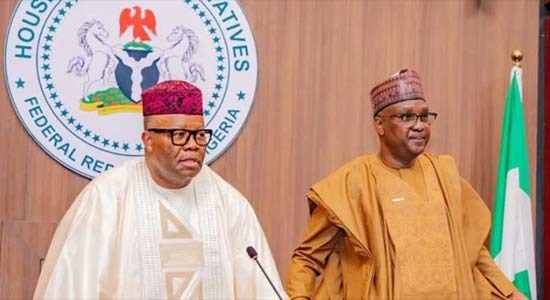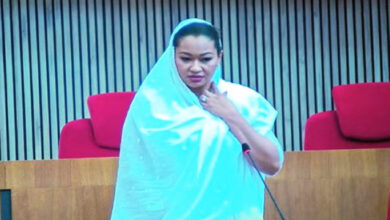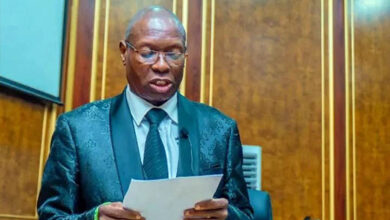Withdraw ‘Repressive Bill To Regulate Bloggers Or Face Legal Action’, SERAP Tells Akpabio, Abbas

Socio-Economic Rights and Accountability Project (SERAP) has urged the Senate President, Godswill Akpabio, and Speaker of the House of Representatives, Tajudeen Abbas “to immediately withdraw the repressive bill for an act to amend the Nigeria Data Protection Act 2023, which seeks to regulate the activities of bloggers operating within the ‘territorial boundaries of Nigeria.’”
SERAP urged Mr Akpabio and Mr Abbas “to ensure that any amendment to the Nigeria Data Protection Act promotes and protects the rights of bloggers and other journalists and does not undermine the fundamental human rights of Nigerians.”
SERAP also urged Mr Akpabio and Mr Abbas “to end the imposition of unnecessary restrictions on the rights of Nigerians online and Internet-based content.”
There is currently a bill titled “A Bill for an Act to Amend the Nigeria Data Protection Act, 2023, to Mandate the Establishment of Physical Offices within the Territorial Boundaries of the Federal Republic of Nigeria by Social Media Platforms and for Related Matters” (the “bill”).
The bill among others seeks to regulate bloggers including by requiring all bloggers to register local offices and join recognised national association for bloggers. The bill has passed its first and second reading in the Senate.
In the letter dated 12 April 2025 and signed by SERAP deputy director Kolawole Oluwadare, the organisation said: “This bill is a blatant attempt to bring back and fast-track the obnoxious and widely rejected social media bill by the back-door.”
SERAP said, “If passed, the bill would also be used to ban major social media platforms—including Facebook, X (formerly Twitter), Instagram, WhatsApp, YouTube, TikTok, and independent bloggers if they ‘continuously fail to establish/register and maintain physical offices in Nigeria for a period of 30 days.’”
The letter, read in part: “Lawmakers should not become arbiters of truth in the public and political domain. Regulating the activities of bloggers and forcing them to associate would have a significant chilling effect on freedom of expression and lead to censorship or restraint.”
“The bill may also be used to block access of Nigerians to social media platforms. Blocking access to social media platforms is a flagrant violation of fundamental rights.”
“In addition to infringing on Nigerians’ right to access to information and digital technology, the proposed bill would also severely hamper business operations in the country, as many are reliant on foreign tools, services and technologies for their operations, as well as other sectors that rely on online information.”
“The bill would force international tech companies out of the Nigerian information landscape by requiring them to establish/register and maintain physical offices in the country. It would violate the requirement that the right to freedom of expression applies ‘regardless of frontiers.’”
“Should the National Assembly and its leadership fail to withdraw the bill to regulate the activities of bloggers, and should any such bill be assented to by President Bola Tinubu, SERAP would consider appropriate legal action to challenge the legality of any such law and ensure it is never implemented in the public interest.”
“The regulation of bloggers may be used to muzzle any dissenting voice and to silence any form of criticism or negative opinion on the policies and practices of the ruling party or the Government.”
“Authorities may also use the proposed regulation as a pretext to punish bloggers solely for the peaceful exercise of their human rights.”
“The bill seems to be directed at bloggers living in Nigeria and elsewhere, with severe adverse effects on the freedom of expression of a very wide range of individuals.”
“The proposed amendment to the Nigeria Data Protection Act, 2023 fails to meet the requirements of the Nigerian Constitution 1999 [as amended] and international human rights treaties to which the country is a state party.”
“The amendment, if passed would adversely affect unregistered bloggers operating ‘within the territorial boundaries of Nigeria.’”
“The proposed amendment may also be used to violate the rights to privacy, freedom of peaceful assembly and of association as protected by the Nigerian Constitution 1999 [as amended] and international human rights standards.”
“The proposed amendment is entirely inconsistent and incompatible with Nigeria’s obligations to respect and ensure the effective realisation of the right to freedom of opinion and expression. The amendment would disproportionality suppress a wide range of expressive conduct essential to a democratic society.”
“The bill would pose major barriers and threats to any individuals, especially journalists, human rights defenders and civil society organisations who may be critical of the government, as well as stifle democracy and media freedom.”





